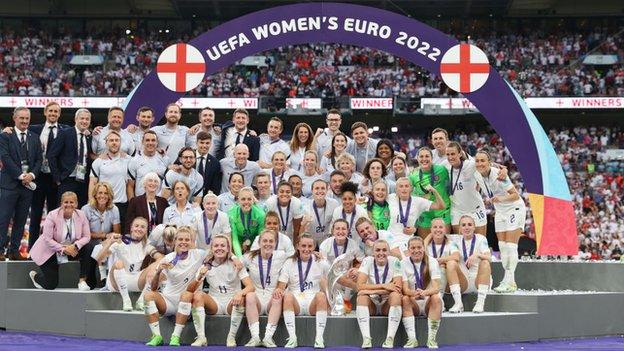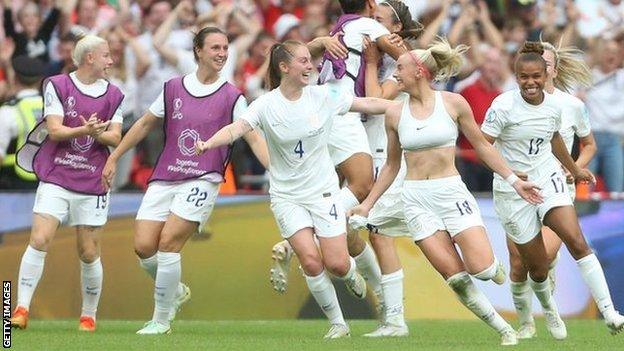Women's football & diversity: 'We don't want anyone feeling it's not their game'
- Published
We wanted to know what the higher powers were doing on diversity - Williamson
"We don't ever want anybody to feel like it's not their game, because of the way they look or the colour of their skin. We would be devastated if we felt like we were contributing to that."
As captain, Leah Williamson played a key role in England winning the Euros this summer.
It was a tournament that made history - breaking attendance records and showing how much women's football has grown in the past five years.
But in one very visible area, it also sparked a more difficult conversation on the apparent lack of progression - the ethnic diversity of the squad...
In the past few years, the number of black, Asian and minority ethnic players in an England team for a major tournament has decreased from six in 2007 to two mixed-heritage players at the 2019 World Cup.
There were three mixed-heritage players- Jess Carter, Nikita Parris and Demi Stokes - in the Euro 22 squad, but none were part of the largely unchanged starting 11.
"Within the squad, this is an important issue and we're all aware of it," Williamson, told BBC Sport about the lack of diversity. "There's nothing that we can do right now to change it."
Williamson says the players have "asked those questions" of what the "higher powers" are doing to address the lack of representation and make women's football more inclusive.
"The visibility, the accessibility, all of those things from the bottom need to be better so that we don't lose the diversity of the game."
At the Women's World Cup in 2019, Stokes and Parris were the only non-white players in England's 23-player squad. In the men's World Cup squad the year before, there were 12 players from the 23 - celebrated as "representing modern, multicultural England".
Compared with the men's game, the pool of black, Asian and minority ethnic players to choose from in women's football is a lot smaller.
It is estimated that the proportion of players in the Women's Super League is lower - between 10-15% - compared with about 33% in the Premier League.
In 2021, Baroness Sue Campbell, the Football Association's director of women's football, told BBC Sport the issue is linked to accessibility.
"It's not inclusive enough. And it's not diverse enough, and we know it," she said at the time.
Nearly two years on, Baroness Campbell told BBC Sport the FA is making "good headway" with its new Discover My Talent, external programme, set up in partnership with the EFL Trust.
"That's people going into those inner-city areas that perhaps traditional football clubs have not reached," she said.
Arsenal and England's Lotte Wubben-Moy has used her social media platforms to speak out about the lack of diversity in women's football before.
Allow X content?
This article contains content provided by X. We ask for your permission before anything is loaded, as they may be using cookies and other technologies. You may want to read X’s cookie policy, external and privacy policy, external before accepting. To view this content choose ‘accept and continue’.
"I'm from London, I see a lot of deprivation," she told BBC Sport. "I see a lot of young children who don't have opportunities. And while I feel like I have responsibility to talk about it, I think everyone does."
"If [young girls] want to pursue football they should have access to academies and centres of excellence to take that next step."
"I'm not going to sit here and say I feel any hardship. I'm white, I have such a massive privilege and I acknowledge that, which is part of the reason why I feel like I have such a responsibility also to push for more change to allow young, black, Asian, any child to be able to see someone like them playing football. You've got to see it to believe it," said Wubben-Moy.
'England's Euro winners did not inspire me'

England celebrate winning the Women's Euros at Wembley
Sapphire McIntosh grew up playing in Leeds United's youth teams. She says watching the England team at the Euros reminded her of playing at Leeds when she was younger.
"I was the only black girl in the under-16s development squad. I wasn't made to feel comfortable.
"[The Euros] just reminded me of playing footy there. Even at university, that's pretty much how it always looked, like the England women's team," she told BBC Sport.
McIntosh says during her first year at Leeds, none of the other players talked to her, but she continued playing out of sheer love for the game, despite it taking "bravery".
Growing up, she was a huge Rachel Yankey fan, but says now there are fewer players to inspire girls of colour, making the sport less relatable for them.
"I don't really know if I look at the England women's team and go 'oh, this is me, this is inspiring'. That's not really where I get my inspiration.
"France had a diverse group of women and a lot of black women there. And that made me warm to them a bit more," she said.
Leeds told BBC Sport: "We are deeply disappointed to hear about Sapphire's experience and we have reached out to her to try to learn more about the issues she faced.
"Since we relaunched the Leeds United Women's setup in 2017, we have worked closely with the team and staff to ensure inclusion is at the heart of everything the club does and we will continue to work hard to educate those within the club and those across our community."
McIntosh, who now lives in London, says she also struggled to get to training and matches - with accessibility another barrier to better diversity.
Kay Cossington, the FA's head of women's player development and talent, told She Kicks magazine in 2020 that "inclusivity was compromised as we attempted to turn more professional", adding "we had 52 centres of excellence; that was too many for the depth of talent at the time".
Those 52 centres were reduced to 30, with many in rural areas - but the FA says it's new 'emerging talent centres' approach has 60 centres, close to it's target of 70 and making "a very positive picture".
An FA spokesperson said the new programme will engage with approximately 3,810 players - a 92% increase on the 1,722 players under the old pathway.
Goalkeeper Aman Dosanj signed for Arsenal's academy when she was 16 years old. In 1999, she became the first British South-Asian player to represent England at any level, playing an U16s tournament.
She says she experienced racism throughout her career, from microaggressions to being called racial slurs while she was playing.
"You need to remember that regardless of whether you're on a football pitch, or away wherever you are, our race enters a room before we do."
"I can see why so many parents are scared to put their kids into that kind of hostile environment."
And those environments aren't just a thing of the past. In 2017, the FA apologised to England players Eniola Aluko and Drew Spence for racially discriminatory remarks made by sacked England women's boss Mark Sampson. It was a high-profile case that made headlines for more than a year.
In 2021, former Lioness Anita Asante, who was playing in Sampson's England squad at the time, told BBC Sport: "For young girls from similar backgrounds watching that, they would have probably been disheartened to have seen the negative impact it had on those individuals and also the actions at the time of the squad.
"That perception or lack of support for the person experiencing a form of discrimination or racism to the nation publicly, is not going to have a positive image or impact to young people."
Baroness Campbell says she is now confident the FA has "tackled the cultural issues" within coaching.
"We're really focused on making sure that culture is welcoming and respectful of different people from different backgrounds. We've done a lot of coach education and coach development internally.
"As much as we can manage it, we're getting it right and we're very vigilant if it's not right," she told BBC Sport.
'Every household is different - the flaws are in the system'

England's Chloe Kelly scores the goal to help England beat Germany and win Euro 2022
Dosanj, who wrote her university dissertation on the lack of British South Asian footballers, says it's important people don't solely focus on cultural barriers when talking about the lack of representation.
"We're not a monolith. Every household is going to be completely different."
"So many people look at the problem of under-representation of something and they're always trying to look at faults in the group. 'Asians are too small, they're too frail. They only care about education, the religion…'
"We need to stop looking at what's wrong in a group start looking at what's wrong with the system. There are huge flaws in the system. What are we doing to educate ourselves about anti-racism because anti-racism is a practice," she said.
The FA has "emerging talent centres," said Baroness Campbell, "which means we've now got nearly three times the reach we used to have with regional talent centres.
"You can't look at the top and say, 'OK, these are the issues'. It's too late, you need to start at the bottom."